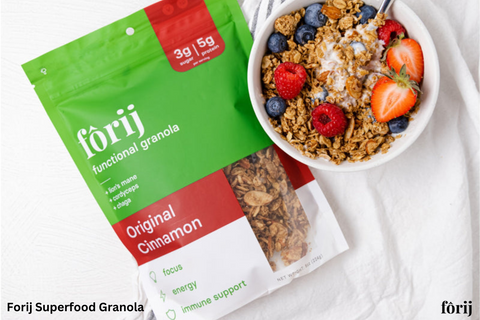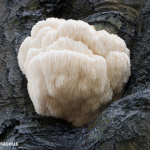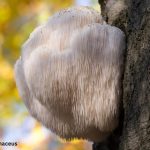The lion’s mane is one of the the healthiest mushrooms on the planet. It also happens to be great as a pre-workout supplement. Let’s dive deep into how this fungus can enhance athletic performance and muscle composition.
What are the benefits of lion’s mane?
What are the negative effects of lion’s mane?
What does lion’s mane do before training?
How can lion’s mane improve athletic performance?
How can you get the lion’s mane before the workout?
How Much Lion’s Mane Should You Take Before Training?
How much lion’s mane is in AdaptogenShroomsgranola?
To know more about this mushroom, check out our detailed guide to lion’s mane mushrooms.
What are Lion’s Mane Mushrooms?
The lion’s mane mushroom (Hericium erinaceus) is an adaptogenic mushroom that has long been used in alternative medicine. It grows best in temperate to cool climates and can be found in North America, Northern Europe and Asia.
Check out our in-depth explanation of adaptogenic mushrooms to learn more about how lion’s mane works.
Health benefits of lion’s mane
The benefits of lion’s mane range from immune health to the ability to alleviate inflammation and oxidation to preventing cancer and maintaining brain health.
When it comes to cognitive function, the lion’s mane is hard to beat.
- Improves mental clarity
- Reduces brain fog
- It enhances memory
- It stimulates neurogenesis
- Fights depression and anxiety
For other health-related facts and studies, check out our guide to the benefits of lion’s mane mushroom.
Side effects of lion’s mane
There are no long-term side effects from supplementing with lion’s mane. If you are new to adaptogens, you may experience some stomach discomfort, bloating, or diarrhea when you first start taking it, but these side effects should subside after a few days of use.
What does Lion’s Mane do before training?
Lion’s mane mushroom reduces fatigue, increases energy levels, and can increase blood flow to muscles, which is why it’s commonly used as a pre-workout supplement. This mushroom can also improve your mental focus and concentration and help with the mind-muscle connection that is vital for building muscle.
Lion’s Mane Sports Performance Benefits
There are many ways lion’s mane can improve an athlete’s performance.
The mushroom improves fat metabolism and prevents weight gain, helping athletes stay in optimal shape. It is also an amazing natural source of energy, promotes muscle growth and reduces oxidative stress and inflammation.
To learn more about how lion’s mane can improve athletic performance, read our article on the benefits of Hericium erinaceus for athletes.
Is lion’s mane good for muscle growth?
Yes, Lion’s mane is one of the best natural muscle builders and is often used by bodybuilders.
This mushroom contains all seven essential amino acids as well as eight non-essential amino acids for muscle growth. Lion’s mane also promotes muscular endurance, which will help you in your efforts to build muscle.
ONE Animal study 2019 showed that lion’s mane significantly increased muscular endurance. It did this by activating the peroxisome proliferator-activated receptor, a nuclear receptor found in skeletal muscle.
Does the lion’s mane give you energy?
A major benefit of using lion’s mane as a pre-workout is its ability to increase energy levels without causing an energy crash. In a 2014 studythis mushroom has been shown to be effective in reducing fatigue, at least in animals.
In terms of exercise, the mice in this study that were given lion’s mane extract performed significantly better than their control counterparts after 28 days. These mice also showed fewer metabolic signs of fatigue, with blood lactate levels significantly lower in mice given lion’s mane.

Can lion’s mane reduce inflammation?
Post-workout soreness and inflammation can make it difficult to exercise at your best. Lion’s mane is one of the best mushrooms for reducing inflammation and recovery time. According a recent studythis mushroom reduced inflammation by inhibiting TLR4-JNK signaling.
According to a 2019 study, the TLR4-JNK pathway promotes inflammation. By inhibiting TLR4-JNK signaling, lion’s mane appears to reduce inflammation levels in adipose tissue, which is associated with obesity and is generally prone to chronic inflammation.
Check out our article on the anti-inflammatory properties of lion’s mane to learn more about how this mushroom can help you fight inflammation.
Is lion’s mane high in protein?
Lion’s mane is an amazing source of plant protein. This mushroom contains, on average, 25 g of protein per 100 g of dry lion’s mane. In addition, lion’s mane contains seven essential and eight non-essential amino acids. These amino acids are vital for muscle growth.
Should I take Lion’s Mane before or after a workout?
If you want to boost your energy levels and prepare for a good workout, take lion’s mane right before your workout. However, you will benefit from this mushroom even if you take it after a workout, especially if you take it to reduce physical fatigue and inflammation.
Interested in taking Lion’s Mane pre-workout?
If you want to start taking lion’s mane pre-workouts, you should choose the highest quality supplement on the market. And, at the risk of sounding biased, you’ll find exactly what you’re looking for our functional mushroom granola.
Our granola contains a high-quality, ultra-concentrated lion’s mane extract, which contains all the beneficial compounds found in this mushroom (even the ones you can’t absorb by eating fresh lion’s mane).
Plus, the granola is vegan, gluten-free, made with healthy ingredients, and delicious. What more could you want from a pre-workout meal to help you reach your full potential in the gym?

Lion’s Mane Pre Workout Dosage
The optimal dosage for lion’s mane before training varies from person to person. If you are new to adaptogenic mushrooms, start with a dose of 750-1000 mg per day and increase the dose gradually until you are satisfied with the results.
Check out our dosage guide for lion’s mane mushrooms to learn more about Hericium erinaceus dosages for various conditions and overall health maintenance.
How much lion’s mane is in AdaptogenShroomsGranola?
AdaptogenShroomsgranola uses high-quality lion’s mane extracts made from whole grains medicinal mushrooms. Our double extraction method extracts both water-soluble beta-glucans and alcohol-soluble triterpenes. Our brewing process breaks down the indigestible chitin cell walls of the mushroom to extract far more of these compounds than conventional processes.
One serving of granola provides us with 250 mg of ultra-concentrated lion’s mane extract, which is eight times more concentrated than a regular lion’s mane powder. So you’re getting as much potency as you would a 2000mg lion’s mane mushroom powder, all in a granola bowl.
Frequently asked questions about the lion’s mane in training
When should you not take the lion’s mane?
Most people are safe to use this functional mushroom, but The lion’s mane has some contraindications. If you have a history of allergies or are allergic to mold, yeast, or other fungi, you should be careful when taking lion’s mane or any other adaptogenic mushroom.
Lion’s mane may also interact with certain medications, such as diabetes medications. If you are taking medications that lion’s mane may interact with, you should consult your doctor before taking Hericium erinaceus.
Can you get the lion’s mane with caffeine?
Yes, Lion’s mane mushrooms can be combined with caffeine. Because these mushrooms do not contain caffeine, you are not at risk of excessive caffeine and anxiety or jitters. Conversely, lion’s mane can mitigate some of these negative effects (for example, Lion’s mane mushrooms may relieve migrainesa common side effect of caffeine consumption).
Does lion’s mane affect hormones?
Lion’s mane appears to stabilize hormone production due to The ability of Hericium erinaceus to promote neurogenesis.
According to a recent study, the compounds found in the fruiting bodies of this mushroom help produce brain-derived neurotrophic factor (BDNF) and nerve growth factor (NGF) in the brain. BDNF and NGF regulate hypothalamic hormone production.
Many hormones begin their production process in the hypothalamus, including testosterone. The effects of this mushroom on the testosterone production of the hypothalamus does lion’s mane is one of the best natural testosterone boosters because testosterone production starts in the hypothalamus. Increased testosterone levels can aid in muscle growth.
Which mushroom is best for pre-workout?
The best pre-workout mushrooms are lion’s mane, reishi and cordyceps mushrooms. Each of these mushrooms is a staple in workout supplements, and for good reason.
They contain essential and non-essential amino acids such as beta alanine and leucine, which help in muscle growth. These mushrooms can also boost energy levels, making them the perfect addition to any pre-workout nootropic formula.
What does lion’s mane do for men?
Due to the effects of lion’s mane on DHT production, this mushroom is one of the best natural testosterone boosters and can be quite beneficial for men.
Lion’s mane appears to stabilize DHT levels. This adaptogenic mushroom will not increase the production of DHT in men who already have high levels of this hormone, but it may do so in people who have low levels of DHT.
What is the optimal dosage of lion’s mane for anxiety?
Start with 250-750 mg of lion’s mane extract per day if you are taking Hericium erinaceus for anxiety. You can gradually increase the dose to 1000 mg, even 2000 mg per day. To avoid digestive issues, it’s best to start small and work your way up, especially if you’ve never taken adaptogenic supplements before.
What is the ideal lion’s mane dosage for neuropathy?
Lion’s mane mushrooms may help with neuropathic pain. Take 500-1000 mg of this functional mushroom 1-3 times a day. The exact dosage will vary from person to person, so you should experiment until you find the ideal dose for you.
Can I mix lion’s mane powder with whey protein isolate?
Yes, you can combine lion’s mane powder with whey protein isolate. However, you may find it taste of lion’s mane to your protein shake to make it extra strong.
Additionally, because whey protein is derived from milk, it is not vegan or suitable for people with lactose allergies. If you’re looking for a vegan sports nutrition alternative, try making protein bars with lion’s mane infused granola.
Is lion’s mane good for digestive health?
Lion’s mane mushroom improves gut health and can be incredibly beneficial for digestion. In 2013, Researchers investigate gastroprotective effects of lion’s mane in rats. The findings show that lion’s mane protected the intestines of rats from ethanol-induced gastric mucosal damage.
Resources
- Komiya, Y. (2019). Enhancement of muscle endurance in mice with dietary Yamabushitake mushroom (Hericium erinaceus) possibly through activation of PPAR d. Animal Science Journal, 90(6), 781-789. https://doi.org/10.1111/asj.13199
- Liu, J. (2014). Antifatigue activities of polysaccharides extracted from Hericium erinaceus. Experimental and Therapeutic Medicine, 9(2), 483–487. https://doi.org/10.3892/etm.2014.2139
- Mori, K. (2015). The anti-inflammatory effects of the culinary-medicinal mushroom Hericium erinaceus (higher basidiomycetes) in a co-culture system of 3T3-L1 adipocytes and RAW264 macrophages. International Journal of Medicinal Mushrooms, 17(7), 609–618. https://doi.org/10.1615/intjmedmushrooms.v17.i7.10
- Li, W. (2019) TLR4 promotes liver inflammation by activating the JNK pathway – PubMed. (2019, September 1). PubMed. https://doi.org/10.26355/eurrev_201909_18889
- Lai, PL (2013). Neurotrophic Properties of the Lion’s Mane Medicinal Mushroom, Hericium erinaceus (Higher Basidiomycetes) from Malaysia. International Journal of Medicinal Mushrooms, 15(6), 539–554. https://doi.org/10.1615/intjmedmushr.v15.i6.30
- Wong, JY (2013). Gastroprotective effects of the lion’s mane mushroom Hericium erinaceus (Bull.:Fr.) Pers. (Aphyllophoromycetideae) extract against ethanol-induced ulceration in rats. Evidence-Based Complementary and Alternative Medicine, 2013, 1–9. https://doi.org/10.1155/2013/492976
Disclaimer AdaptogenShroomsFDA
ABOUT THE AUTHOR
Mushy is your mentor in the enchanting world of adaptogenic mushrooms. An expert in mycology and holistic medicine, he fuses contemporary science with traditional wisdom to lift the veil on the benefits of mushrooms for health and well-being. With an informed, science-based approach, Mushy guides you through the mysterious world of mushrooms that strengthen the balance and resilience of body and mind. Whether you’re a curious neophyte or a seasoned explorer of medicinal mushrooms, Mushy is your ally in the quest for a more harmonious and energetic life.







